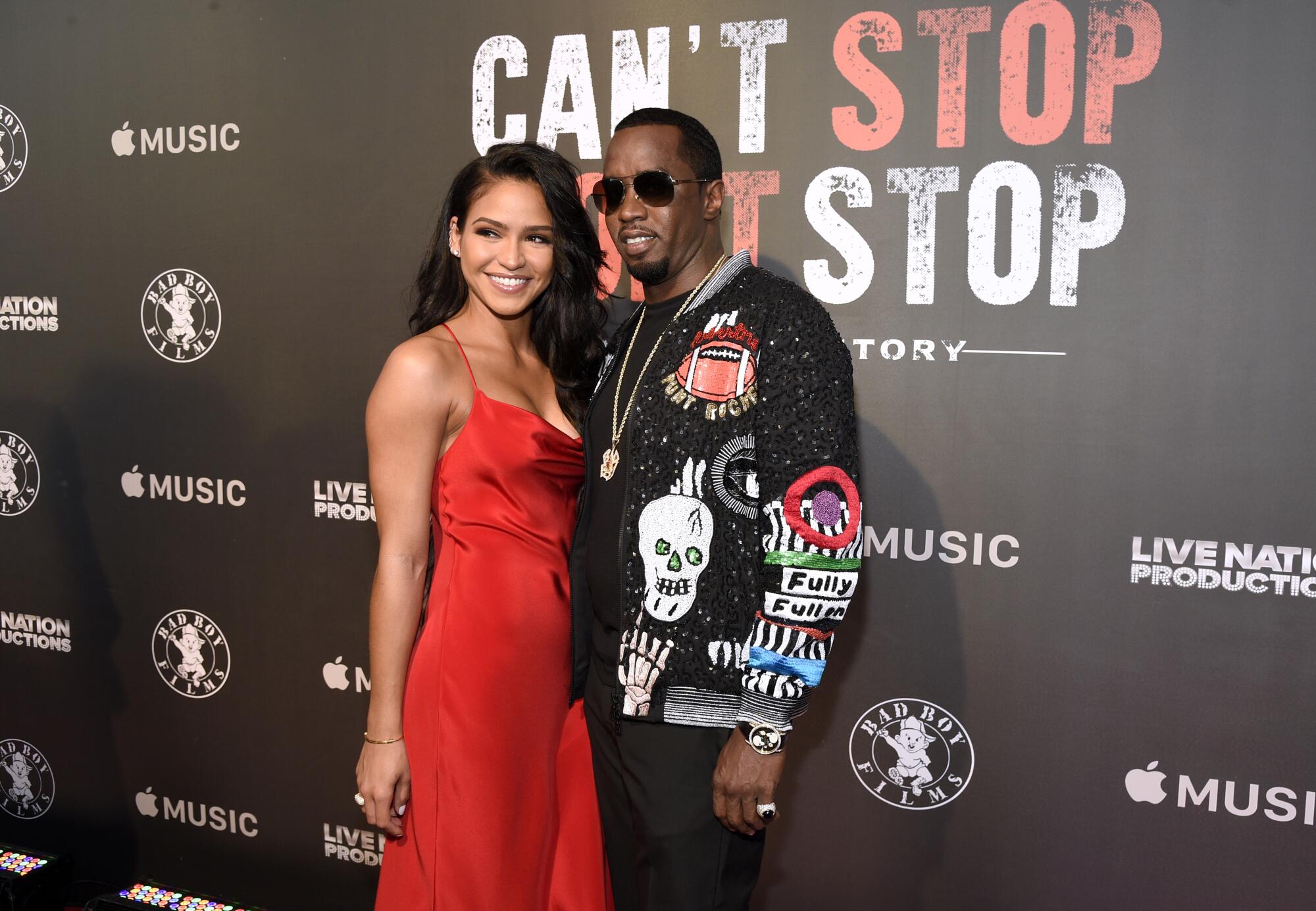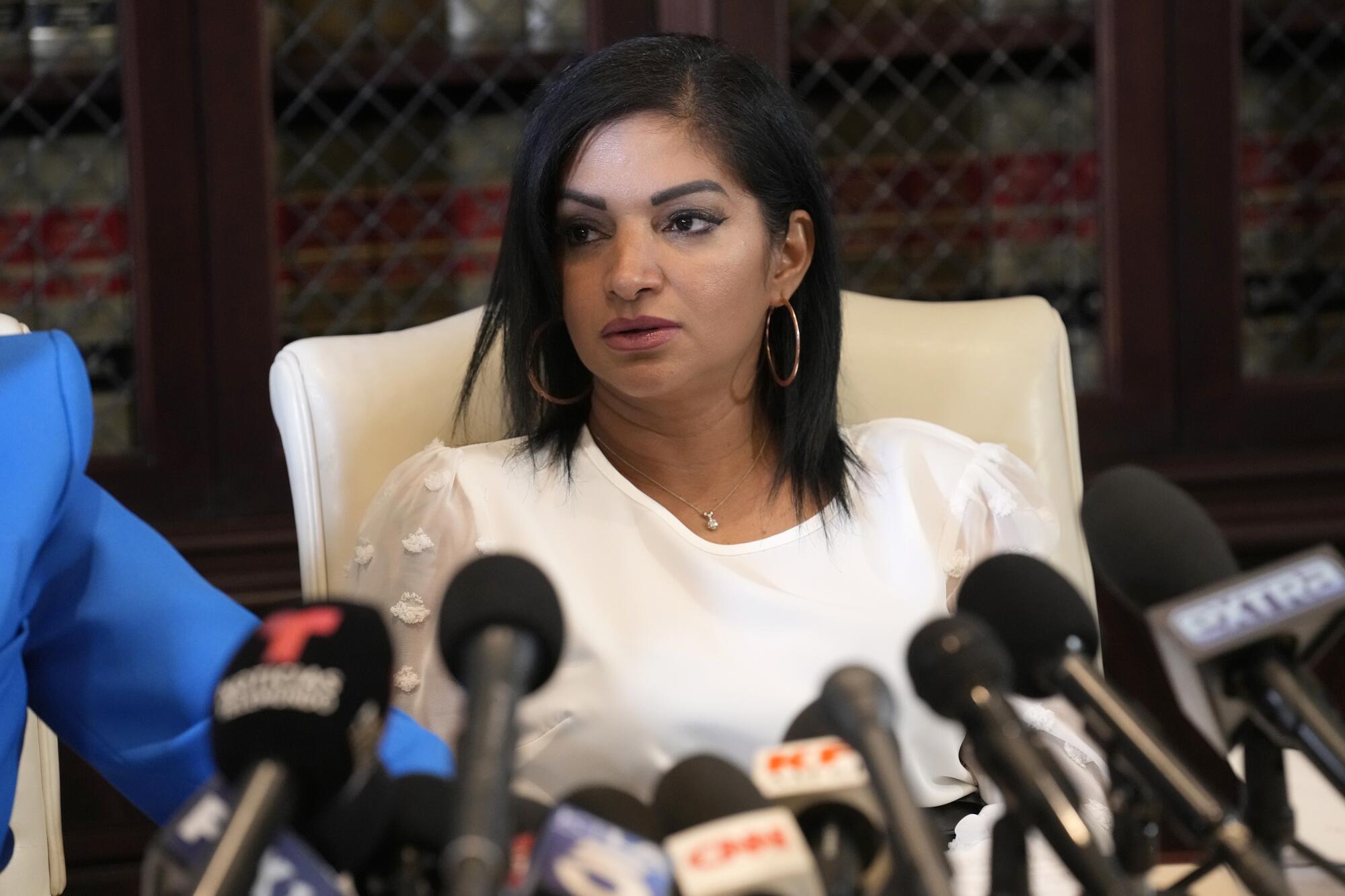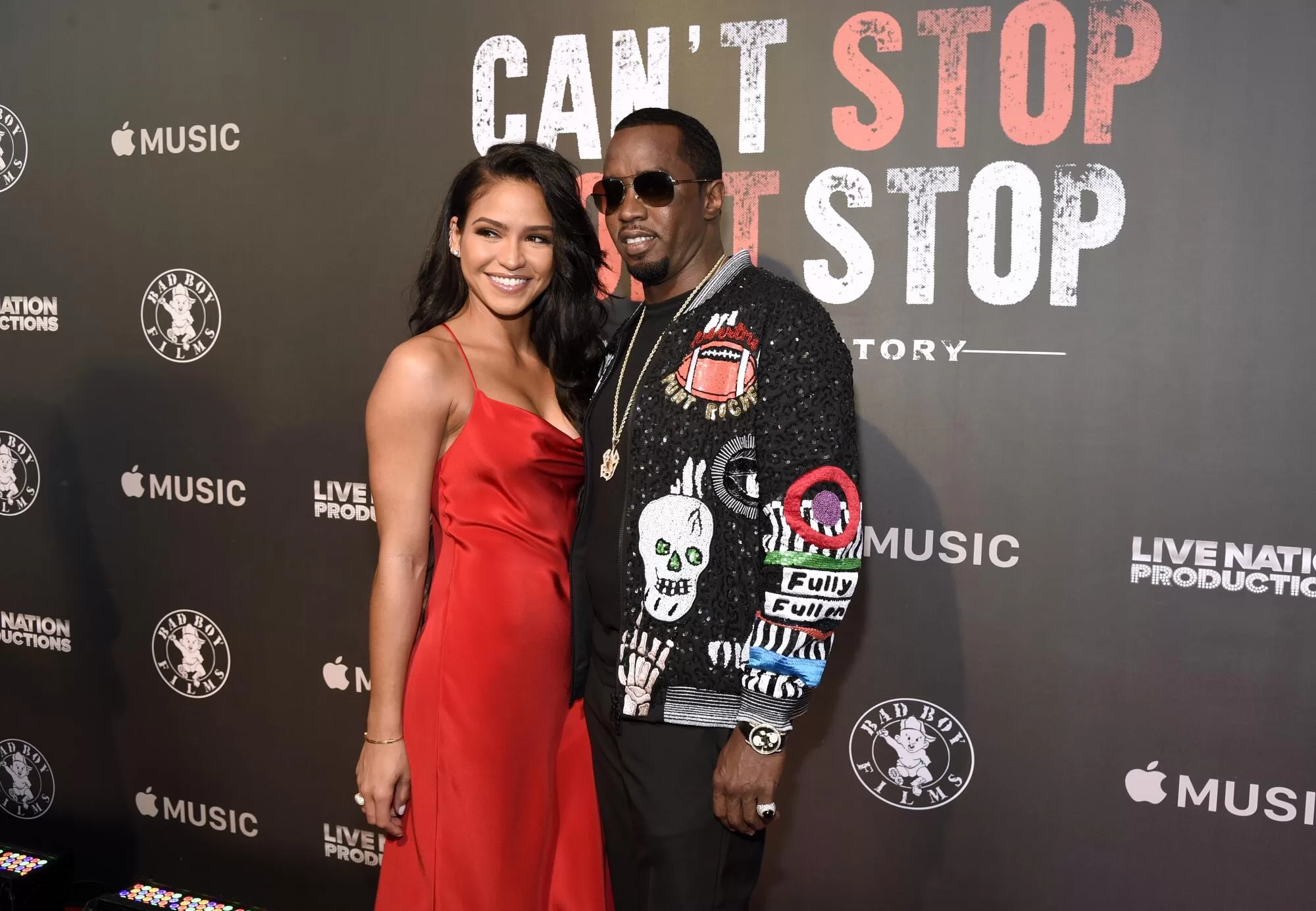In the summer of 2004, Tamiko Thomas, a Bad Boy Entertainment executive, brought an aspiring entertainer named Adria English to Sean “Diddy” Combs’ mansion in East Hampton, N.Y. The rap mogul, bon vivant and tabloid fixture was throwing one of his exclusive, celebrity-filled bacchanals known as a “White Party.”
English claims that Thomas hired her to work as a go-go dancer. But over the next five years, she says, she was forced to participate in “grotesque, inexcusable, exploitative and criminal” activities at multiple White Parties held in various locations, including Combs’ home on Star Island in Miami.
In a recent 114-page lawsuit that she filed against Combs, Thomas and others, English alleges that she was plied with drugs and ecstasy-laced liquor and “passed off” by Thomas and Combs to be “sexually assaulted as part of their ongoing corrupt sex trafficking organization.”
Further, she said in the lawsuit, a team of Combs’ handlers and associates coordinated the alleged activities, including arranging for her travel to and from the soirees, supplying her with illicit narcotics and paying her $1,000 after a sexual encounter.
Once an influential cultural icon, Combs, 54, is now a pariah in the music industry and beyond. He is being held in a federal correctional facility in Brooklyn after a judge ordered him detained until trial following his indictment last month on sex trafficking, racketeering, conspiracy and other charges. Combs has pleaded not guilty. He also has denied the multiple claims of abuse outlined in at least 18 civil sexual misconduct suits filed against him since November.
Combs’ attorneys said in a statement, “Mr. Combs and his legal team have full confidence in the facts, their legal defenses, and the integrity of the judicial process. In court, the truth will prevail: that Mr. Combs has never sexually assaulted anyone — adult or minor, man or woman.”
Underlying the government’s racketeering case and the multiple lawsuits against Combs is a recurring theme: He did not act alone. Combs’ alleged sexual mistreatment of women going back decades was aided and abetted by a complex and vast network of people that included executives who worked with his various business ventures as well as members of his security team and household staff, according to a Times review of court filings and interviews with current and former Bad Boy executives and associates.
“Combs did not do this all on his own,” said Damian Williams, the U.S. attorney for the Southern District of New York, when he announced the charges. “He used his business and employees of that business and other close associates to get his way.”
In recent years, the government has successfully prosecuted powerful figures including R. Kelly and NXIVM cult leader Keith Raniere on similar charges to the ones Combs now faces. Yet Combs’ case stands out for the sheer scope of associates that he surrounded himself with to carry out his alleged crimes, experts said.
“It’s the magnitude of it,” says Nancy Erika Smith, a partner at Smith Mullin in Montclair, N.J., who has represented victims of numerous assault and harassment cases, including that of former Fox anchor Gretchen Carlson against the network’s late chief Roger Ailes.
“How many people have to be enabling that kind of exploitation of women? Drugging them, threatening them, making them engage in sex acts and filming it,” said Smith.
A flamboyant, irrepressible hustler, Combs rose from hip-hop’s birthplace to become a force in music.
Just two years ago, the Harlem-born rapper received a lifetime achievement honor at the BET Awards. Last year, the MTV Video Music Awards bestowed its Global Icon award on Combs.
Combs formed Bad Boy Records in the early 1990s with the backing of legendary Arista executive Clive Davis and churned out a parade of critical and commercial hits developing such artists as the Notorious B.I.G and Faith Evans. He became an A-list artist in his own right, appearing on 15 Top 10 hits as writer, producer or featured lead artist.
Later branching out into fashion and other enterprises, Combs’ marketing deal with beverage company Diageo for Cîroc brand vodka paid him nearly $1 billion over the years. He co-founded Revolt TV, a cable network and multimedia company.

Cassie Ventura, left, and Sean “Diddy” Combs arrive at the Los Angeles premiere of “Can’t Stop, Won’t Stop: A Bad Boy Story” on June 21, 2017, in Beverly Hills. Ventura filed a bombshell lawsuit against Combs in November for rape, sexual assault and sex trafficking. The suit was settled a day after it was filed.
(Chris Pizzello / Invision / AP)
Combs charted a new fame course in 2000, launching the MTV reality series “Making the Band” — an era-defining hit that spawned several musical acts including Danity Kane.
But as Combs was cementing his position as one of the most powerful players in the music industry, troubling allegations began to surface about his treatment of women.
‘A propensity for violence’
From the start of his career, Combs had a “propensity for violence,” as well as numerous witnesses to it, said Kirk Burrowes, who co-founded Bad Boy Entertainment with Combs in 1992 and served as its president until Combs fired him in 1997.
“It just wasn’t as well known. It’s almost like it was part of his operating manual,” Burrowes told The Times last year. Combs did not respond but has denied sexually assaulting anyone.
In the summer of 2001, Thalia Graves, then 25, was dating a Bad Boy employee when Combs and his head of security, Joseph “Big Joe” Sherman, took her to discuss her boyfriend’s employment, according to a lawsuit she filed in September.
Sherman and Combs picked Graves up at her mother’s home in Queens and they drove to Daddy’s House, Bad Boy’s in-house recording studio in midtown Manhattan. In the lawsuit, she claims that Sherman and Combs gave her a drink she suspected was spiked with a drug and sexually assaulted her while she was passed out.
When she regained consciousness, the lawsuit states, “She was naked, and her hands were tied behind her back with what felt like a plastic grocery bag.”
Graves further alleged that Sherman filmed sexual assaults and then distributed the videos through a pornography company he operated called Rhymes N Dimes Magazine.
Following the alleged assault, Graves said in her lawsuit, both men threatened to ruin her career if she discussed the attack. “Because of their enormous power in the industry, including through their ownership of and positions at the Combs Corporations, Plaintiff knew that they could follow through on their threats,” the lawsuit states.
Sherman could not be reached for comment. Representatives for Combs and Bad Boy Entertainment did not return requests for comment.
Several other woman said in lawsuits they, too, were assaulted at the rapper’s recording studio, where Combs invited young men and women “to use drugs and engage in sex acts,” according to one filing.
Two years after Graves said she was raped, Crystal McKinney, then a 22-year-old model, said that Combs drugged her and forced her to perform oral sex on him at Daddy’s House, according to the lawsuit she filed in May.

Thalia Graves at a press conference on Sept. 24, 2024, in Los Angeles. Graves is suing Sean “Diddy” Combs, accusing him of sexual assault in 2001.
(Chris Pizzello / Invision / AP)
That same year, a 17-year-old high school student alleged in a lawsuit that Harve Pierre — then the president of Bad Boy Entertainment — convinced her to fly from Detroit to New York to meet Combs at the recording studio. Once there she was given drugs and alcohol and then “gang raped” by Combs, Pierre and a third man, according to the lawsuit she filed as Jane Doe last December.
Pierre, who was president of Bad Boy Entertainment until 2017, said in a statement the allegations were “disgusting,” “false” and a “desperate attempt for financial gain.”
Claims of inappropriate behavior against Combs persisted, including from artists who worked with him.
Singer Dawn Richard, a member of Danity Kane and later Combs’ group Diddy-Dirty Money, said in a recent lawsuit that between 2009 and 2011 Combs regularly barged into her dressing room at the studio and groped her.
“Submission to his depraved demands was necessary for career advancement,” Richard’s lawsuit states.
Richard said Combs’ security team once locked her in a Bentley, prompting her to call her father in Baltimore for help. It was only after her father demanded to see Richard that Bad Boy President Pierre instructed security to release her from the car, according to the complaint.
The following evening, after she appeared with Combs on “Saturday Night Live,” she alleges he threatened her saying, “You don’t call your dad unless you’re in the hospital.”
The onslaught of allegations against Combs and his associates became public in November when his former girlfriend, Casandra Ventura, a singer known as Cassie, filed a bombshell lawsuit against Combs for rape, sexual assault and sex trafficking, brought under New York’s Adult Survivors Act.
In the suit, Ventura described a drug-soaked “cycle of abuse” that occurred over 11 years, starting after she and Combs met in 2005, when she was 19 and he was 37. Ventura said that Combs raped her in his home after she tried to leave him; physically attacked her multiple times; and forced her to engage in sex acts with male sex workers — known as “freak-offs” — while filming the encounters.
A powerful network of alleged enablers
Additionally, Ventura said in the suit that many of those in Combs’ orbit helped to keep her trapped — often with threats to her career. In one incident, Ventura claims that James Cruz, president of Bad Boy Management, refused to release her single until she answered Combs’ phone calls.
“Each time Ms. Ventura tried to run away, Mr. Combs and his powerful network would force her back to him,” her suit states. “Ms. Ventura felt that she had no choice but to obey her abuser — even though security guards, assistants, and friends saw the situation she was in, no one dared to help her or speak up on her behalf.”
Surveillance footage taken at the InterContinental Hotel in Los Angeles in 2016 shows Combs brutally beating Ventura before dragging her away. Ventura said in the suit that Combs paid the hotel $50,000 to obtain the surveillance footage, which was released in March and widely circulated.
The federal indictment echoes Ventura’s description of the incident, though she is not identified. Combs has denied her claims.
Although Ventura’s lawsuit was settled a day after it was filed, the case prompted others to sue Combs and his associates.
Producer Rodney “Lil Rod” Jones said in a February filing that Combs repeatedly groped him in 2022 and 2024 at the mogul’s homes in L.A., New York and Miami while he produced nine tracks on Combs’ 2023 “The Love Album: Off the Grid.”
He said when he complained to Kristina “KK” Khorram, the rapper’s chief of staff, she replied, “You know, Sean will be Sean.”
Jones further claimed that Khorram — a former assistant who is alleged to have procured sex workers and drugs for guests at Combs’ parties and properties — required Combs’ household staffers to “walk around with a pouch or fanny pack filled with cocaine, GHB, ecstasy, marijuana gummies, and Tuci (a pink drug that is a combination of ecstasy and cocaine).”
Khorram did not respond to requests for comment.
As Combs’ alleged misconduct took place behind the scenes, plaintiffs have claimed that prominent industry executives were aware of his acts of violence.
At a dinner Combs hosted around late 2009 to celebrate an eight-figure distribution deal between Interscope Records and Bad Boy, the music executive punched his girlfriend Cassie in the stomach, “causing her to double over in visible pain, crying,” according to an account in Richard’s lawsuit.
The assault took place in front of Interscope co-founder Jimmy Iovine and singers Ne-Yo and Usher, the complaint states. Yet the “Bad Boy-Interscope deal took place and remained in effect, providing Mr. Combs with immense financial rewards and enabling him to commit further acts of violence without fear of repercussions.”
Those executives had reason to keep Combs’ actions secret, Richard alleges in her suit.
“Defendants Harve Pierre, Interscope Records, and Bad Boy Records have financially and otherwise benefited from these acts and omissions by keeping Mr. Combs, the volatile and explosive owner of Bad Boy Records, satisfied, and benefited from facilitating his behavior.”
Representatives for Interscope did not return requests for comment.
The permissive culture of the music industry could have been an effective mask for Combs’ actions, said Carol Merchasin, an attorney at McAllister Olivarius who specializes in sex abuse claims among high-demand groups like religious organizations and cults.
“The people in the music industry working for Combs, it’s a very insular group. The drugs and sex get normalized, and you don’t want to lose your community, even if it gets bad,” Merchasin said. “It takes a sophisticated organization to do what he’s accused of. There were people and institutions that should have known what was happening, but there was so much money involved.”
Since the indictment, Combs’ legal troubles have intensified.
This month, six additional lawsuits were filed in New York, contending that between 1995 and 2021 Combs’ security detail stood by while he sexually assaulted a college student in 2004, and helped him beat and rape a male fashion advisor at a rival clothing brand in 2008.
The wave of complaints are the first in an expected tranche of forthcoming filings from dozens of plaintiffs, according to Houston attorney Tony Buzbee.
“We will expose the enablers who enabled this conduct behind closed doors,” Buzbee said in a recent press conference. “We will pursue this matter no matter who the evidence implicates.”
Times Staff researcher Scott Wilson contributed to this report.
